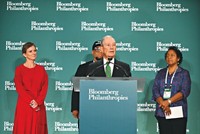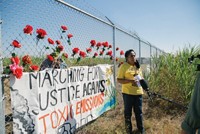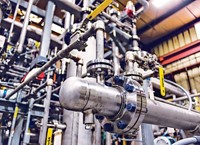Advertisement
Grab your lab coat. Let's get started
Welcome!
Welcome!
Create an account below to get 6 C&EN articles per month, receive newsletters and more - all free.
It seems this is your first time logging in online. Please enter the following information to continue.
As an ACS member you automatically get access to this site. All we need is few more details to create your reading experience.
Not you? Sign in with a different account.
Not you? Sign in with a different account.
ERROR 1
ERROR 1
ERROR 2
ERROR 2
ERROR 2
ERROR 2
ERROR 2
Password and Confirm password must match.
If you have an ACS member number, please enter it here so we can link this account to your membership. (optional)
ERROR 2
ACS values your privacy. By submitting your information, you are gaining access to C&EN and subscribing to our weekly newsletter. We use the information you provide to make your reading experience better, and we will never sell your data to third party members.
Persistent Pollutants
Activists rally to put a lid on plastics
Environmental and community groups come together on an action plan for the Biden administration
by Rick Mullin
February 19, 2021
| A version of this story appeared in
Volume 99, Issue 10

Climate change, fracking, air and water pollution, toxic landfills, the disproportionate burden of pollution on communities of color. There is no paucity of targets for improving our environment, just as there is no shortage of organizations and community advocates trying to make a change. Could there be a way to find focus, to channel all that energy in one direction? The answer may come down to one word: plastics.
The idea came forth powerfully late last year when more than 550 groups, including international environmental organizations like Greenpeace and regional community advocates such as the Louisiana Bucket Brigade, delivered a petition to newly elected US president Joe Biden calling for executive action to reduce plastic waste, pollution from plastics manufacturing, and plastics production itself.
The Presidential Plastics Action Plan, referred to on its website and on social media as #PlasticFreePresident, now has over 600 signatories. Its goals include curbing production of single-use plastics and halting permits for new plastics facilities.
Meanwhile, the Break Free from Plastic Pollution Act, a 2020 bill due to be reintroduced in the US Senate in the months ahead by Jeff Merkley (D-OR) and in the House of Representatives by Alan Lowenthal (D-CA), calls for similar legislative action to curtail plastics pollution.

Environmental groups anticipated an opening for a campaign against plastics pollution in the event of Biden’s election last year. Candidate Biden’s commitment to making climate change, environmental justice, and heightened regulation of polluters part of his legislative platform promised a sea change after the administration of Donald J. Trump.
The action plan was ready to be presented within weeks of Biden’s election. An executive order addressing climate change signed by President Biden a week after he took office hints at support for several objectives of the plastics action plan. Moreover, it indicates an openness to the executive action that environmentalists and community leaders want Biden to take in his first year in office.
The action plan arose primarily in response to “the aggressive expansion” of the petrochemical industry on the Gulf Coast and in Appalachia, according to Stephanie Prufer of the Center for Biological Diversity, the environmental group that initiated the plan. “We’re calling for a ban on new petrochemical infrastructure,” Prufer says, “but we also call for a bill that bans fracking and bans the export of gas liquids and monomers and polymers used for plastic production so that we could really target the entire supply chain.”
Activists say environmental organizations across the board are ready to shift from a global view of climate change and ocean pollution to a more local focus on the impact of pollution on people near manufacturing plants and waste incinerators. Community groups, they say, are coming to recognize the health impacts along the entire plastics life cycle, starting with raw material extraction and ending with recycling, landfilling, and incineration.
Anne Rolfes is director of the Louisiana Bucket Brigade, which is working with communities to halt construction of a Formosa Plastics petrochemical plant in St. James Parish, Louisiana. She says environmental groups have come to see the effects of industrial pollution on communities as a more visceral rallying call than plastic waste in the ocean.
“St. James Parish is getting a lot of attention right now” because of the fight against the Formosa cracker, she says. “It would wipe out this historic Black community. So there is a reason at the moment that Formosa and the plastics industry is the poster child for environmental injustice.”
Sharon Lavigne, a resident of St. James Parish and founder of Rise St. James, a community group spearheading opposition to the cracker, says she is encouraged by the presidential action plan. Her group is among those endorsing the initiative. “We are trying to let them see that we don’t need that much plastic,” she says, referring to the proposed Formosa complex. “The chemicals they use to make the plastics are cancer causing. To make these plastics, we have to sacrifice our lives.”
Ethan Buckner, an energy campaigner with Earthworks, says the environmental group is taking a cue from industry and shifting its traditional focus on oil and gas toward plastics. “The gas industry is redefining its business model as the world increasingly looks to move away from fossil fuels,” Buckner says. This shift is illustrated in western Pennsylvania, where the natural gas industry sees a promising new market in a cracker and polyethylene plant that Shell Chemical is building on the Ohio River near Pittsburgh.
Earthworks sees the Presidential Plastics Action Plan, which has eight action points, as an appropriate response. “The point we’re most focused on is number 2, the suspension or denial of permits for new or expanded plastic production facilities,” Buckner says. “Our main focus is around that infrastructure.”
Similarly, the Global Alliance for Incinerator Alternatives (GAIA), a coalition of environmentalist groups focused on sustainable development and environmental justice, wants to take on the full plastics life cycle. “The plastic pollution problem is extraordinary and needs to be addressed on multiple levels,” says Denise Patel, regional director for GAIA in the US and Canada.
Environmental justice is an overarching objective in the Presidential Plastics Action Plan, Patel says. GAIA, like Earthworks, is particularly interested in stopping permits for new and extended production facilities in order to protect communities, she says.
Environmentalists and community groups are familiar enough with the basic economic drivers of huge petrochemical plants, as well as the local politics involved, to know that a permitting halt is a long shot. Robert Schmetzer, president of the Beaver County Marcellus Awareness Community, a Pittsburgh-area group leading public resistance to the Shell project, says large corporations are ultimately driven by profit considerations.
“The marketplace is going to dominate whether a business is going to survive or die,” says Schmetzer, the former mayor of South Heights, Pennsylvania, and an outspoken opponent of the plant. Schmetzer takes some solace in the fact that the economics of making plastics have softened in recent years.
Jan Dell, a chemical engineer who heads the Last Beach Cleanup, a California-based group that is a convening member of the Presidential Plastics Action Plan, agrees with Schmetzer. “What brings the development of new projects like crackers to a halt is poor economics,” says Dell, formerly vice president of clean energy at Wood Group, a multinational engineering group. “But these projects need to undergo greater scrutiny from the Environmental Protection Agency for their impacts on communities—environmental and social impacts.”
Dell says the plastics action plan is the culmination of a “perfect storm” that formed in 2017. That year, a report in
Consequently, the chemical industry suddenly faced a public newly concerned about single-use plastics—a potent and tangible target. Unlike carbon emissions, “you can see plastics,” Dell says.
Industry reacted in part by forming a new association, the Alliance to End Plastic Waste. Its members include Shell, Formosa, ExxonMobil, and other major plastics manufacturers, most of which are also members of the American Chemistry Council (ACC), the leading US chemical industry association.
Environmentalists characterize the alliance, whose members have vowed to contribute $1.5 billion over 5 years to support the group’s efforts, as a reactionary move by industry and a textbook example of greenwashing. They note that work underway by a partnership between the alliance and Renew Oceans to remediate the world’s most polluted rivers halted last March with the onset of the pandemic, according to a Reuters article published in January.
In an emailed response to C&EN, Jessica Lee, vice president of communications for the alliance, confirms that the project with Renew Oceans was canceled last year after work stopped following the onset of the COVID-19 pandemic. Other alliance projects continue, she says, including a waste management facility in Indonesia and a plastic waste processing plant in Ghana.
The ACC, for its part, says that over the past 3 years, its members have invested $5.3 billion in 64 recycling projects across the US. The ACC estimates the projects will eliminate more than 4 million metric tons of waste from landfills.
“We want plastics to be collected, recycled, and reused,” says Joshua Baca, vice president of the ACC’s Plastics Division. “We are going to continue to lead on a lot of these issues. We are going to continue to make improvements on the design and the efficiency of plastics, and we are going to work in a bipartisan fashion with lawmakers.”
Baca dismisses the call for bans of production permits. “We’d be outsourcing an entire industry to China and India,” eliminating jobs in the US without doing anything to limit production, he says. Moreover, he points out that plastics are used to make essential durable and disposable products, including medical devices, food packaging, and lightweight automobiles—the last contributing significantly to reducing climate-changing emissions.
The ACC will have a chance to weigh in on the Break Free from Plastic Pollution Act when it is reintroduced this year. The bill sets forth requirements related to plastic waste and recycling and holds industry accountable for its impact on communities most affected by pollution.
“Plastic pollution is fanning the flames of climate chaos, and poisoning our air, water and soil—all of which are disproportionately impacting Black, Brown, and low-income families,” Senator Merkley says in an emailed response to queries from C&EN. Merkley says the act is intended to “unleash American ingenuity and establish critical environmental and public health safeguards for plastic facilities.”
Groups endorsing the Presidential Plastics Action Plan are encouraged by the executive order on climate change signed by President Biden a week after his inauguration. While the order does not mention plastic pollution, it commits to making climate consideration an essential element of foreign policy and domestic security and to delivering “environmental justice in communities all across America.”
Prufer at the Center for Biological Diversity says the action plan’s backers have been in touch with Biden’s team since November. “We had the plan sent around to some of the important people in the transition team before Biden’s inauguration and since then have been sending the plan to other members or incoming agency leads,” she says.
She notes that Michael Regan, the new head of the Environmental Protection Agency, said he was familiar with the action plan at his Feb. 3 Senate confirmation hearing. In response to questions from Senator Merkley, Regan committed to taking a closer look at it.
Advertisement
Environmental groups are understandably optimistic about the Biden administration’s objectives, but they are also aware that industry and political opposition to the action plan will be formidable.
“We worked really hard to make sure that we were prepared for a shift to a Democratic administration, because we knew the American Chemistry Council was going to be prepared,” GAIA’s Patel says. She adds that work on the action plan took place early in 2020 with no assurance that Trump would be defeated in his quest for reelection, or if so, by whom.
“We are always prepared for the worst,” Patel says, “because we’ve learned over time to do that. But we are definitely feeling hopeful.”
Update
This story was updated on March 15, 2021, with new information from the Alliance to End Plastic Waste about waste remediation projects.







Join the conversation
Contact the reporter
Submit a Letter to the Editor for publication
Engage with us on Twitter